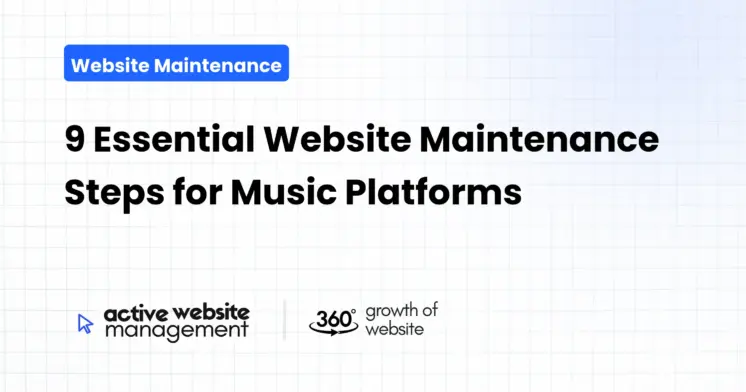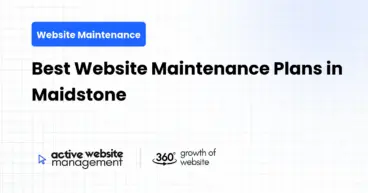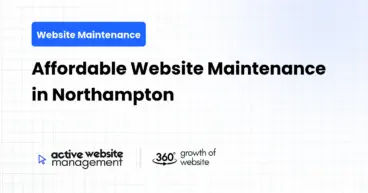January 27, 2025
15 min read
Maintaining a music platform is like tuning a finely crafted instrument. Just as a guitar needs regular care to stay in tune and produce beautiful sounds, your website requires consistent attention to ensure it delivers a smooth and engaging experience for your users. Ignoring website upkeep can lead to frustrating glitches, lost listeners, and a tarnished online presence. This article explores 9 essential steps to keep your music platform humming along perfectly, covering everything from backend security to front-end performance.
Why it Matters: Think of software and plugins as the building blocks of your music platform. Outdated components are like worn-out gears – they slow things down, create vulnerabilities, and can ultimately cause the whole machine to break down. Updates are crucial because developers are constantly improving code, patching security loopholes, and adding new features.
How to Do It:
- Track Updates Diligently: Most content management systems (CMS) like WordPress and Drupal offer notification systems for updates. Pay close attention to these alerts and schedule time to install them.
- Test in a Staging Environment: Before deploying updates live, create a copy of your website (a staging environment). This allows you to test for compatibility issues and fix them before your users experience any problems.
- Prioritize Security Updates: Security patches should be installed immediately as they often address critical vulnerabilities that hackers could exploit. Treat them like fire alarms – act quickly!
- Automate When Possible: Many platforms offer the option to automate minor updates. This can save you time but make sure to regularly check that the automated process is working flawlessly.
- Stay Informed about Plugin Updates: Plugins add extra functionality to your site, but they can also introduce issues if not updated. Keep a list of your installed plugins and regularly check for new versions.
Benefits:
- Enhanced Security: Protection against hackers, malware, and other online threats.
- Improved Performance: Faster loading times, smoother navigation, and better user experience.
- Access to New Features: You can leverage new functionalities to enhance your platform’s offerings.
- Compatibility: Ensure your website works seamlessly with the latest browsers and technologies.
Why it Matters: In the digital realm, security is not a luxury, it’s a necessity. A music platform holds sensitive user information, including login credentials, payment details, and listening history. Neglecting security can lead to devastating data breaches, loss of user trust, and damage to your platform’s reputation. It’s like locking your house doors – a basic requirement to keep unwanted guests out.
How to Do It:
- Implement a Secure Sockets Layer (SSL) Certificate: This crucial certificate encrypts data transferred between the user’s browser and your server. Look for the padlock symbol in the address bar – that’s a sign of secure communication.
- Use Strong Passwords: Insist on strong passwords from users and regularly change your own administrative passwords. Use a password manager to create and store complex combinations.
- Install a Web Application Firewall (WAF): A WAF filters out malicious traffic, preventing attacks like SQL injections and cross-site scripting. It acts as a gatekeeper for your site.
- Regular Malware Scans: Use a reliable malware scanner to periodically check your website for malicious code and vulnerabilities. This acts as a digital detective, seeking out potential problems.
- Limit Login Attempts: Prevent brute-force attacks by limiting login attempts from a single IP address. If someone fails to log in too many times, temporarily block them.
- Backup Your Data:Regular backups are your lifeline in case of a security breach or any other disaster. Backups allow you to restore your website quickly and avoid any major downtime.
- User Account Monitoring: Keep an eye on unusual activity associated with user accounts. Suspicious behavior like mass downloads or repeated login failures could indicate a compromised account.
Benefits:
User Confidence and Trust: A secure platform builds trust with your users, encouraging them to stay and engage.Data Protection: Safeguarding user information keeps your platform compliant with data privacy regulations.Prevent Financial Loss: Protection from fraud and loss of revenue due to security breaches.Positive Reputation: Avoid negative publicity and maintain a strong online presence.
3. Database Optimization: Keeping Your Data Humming
Why it Matters: Your website database is like a massive filing cabinet – it stores all your music files, user profiles, playlists, and website settings. Over time, this database can become cluttered with unnecessary data, leading to performance slowdowns, and making it harder to find information quickly. Database optimization is akin to a thorough spring cleaning, ensuring everything runs efficiently.
How to Do It:
- Clean Up Unnecessary Data: Regularly delete old, outdated content, unused user profiles, and temporary files. This includes plugin leftovers.
- Optimize Tables: Databases store information in tables. Regularly optimize these tables to ensure data retrieval is fast and efficient.
- Use Database Caching: Caching stores frequently accessed data in memory, reducing the number of database queries and improving page loading times.
- Index your Database Correctly: Properly indexing your database is like creating an index for a book. This makes it much faster to find specific pieces of data and decreases strain on the database.
- Regular Backups: In case you have any issue while optimizing the database you can restore back from backup you created before starting the optimization process.
- Monitor Database Performance: Use database monitoring tools to identify bottlenecks and inefficiencies. It’s like having a doctor check your vitals regularly.
Benefits:
- Faster Loading Speeds: A well-optimized database reduces loading times and improves the overall user experience.
- Improved Search Performance: Finding the right music or artist becomes faster and easier for your users.
- Reduced Server Load: An optimized database puts less strain on your servers, leading to lower operating costs.
- Scalability: A well-optimized database makes it easier to scale your platform to handle more users and content.
Don’t Just Maintain Your Website—
Grow It using Active Website Management! Don't Wait for Growth—Accelerate It with Active Website Management
Why it Matters: The core of any music platform is, of course, the audio files. Large, unoptimized media files can lead to slow loading times, buffering issues, and a frustrating user experience. Think of media management like a careful DJ selection – you want high-quality tracks that play smoothly.
How to Do It:
- Optimize Audio Files: Use appropriate audio encoding (e.g. MP3, AAC) to reduce file sizes without sacrificing quality. There are tons of tools and softwares available for converting audio files.
- Implement Content Delivery Network (CDN): A CDN stores copies of your media files on servers located around the world. This allows users to access files from a nearby server, significantly improving loading speeds.
- Lazy Loading: Use lazy loading for images and videos. This means media is only loaded when a user scrolls down to view it. This helps with faster loading of the website and reduces server load.
- Use Efficient Video Streaming: If your platform includes video, use adaptive bitrate streaming. This adjusts the video quality based on the user’s internet connection.
- Regularly Review and Update Your Files: Make sure your file library is up-to-date, with all information like metadata, artist names, and album covers properly linked.
- Organize Your Media Library: Implement a system to categorize and organize your audio and video files. Makes things easier to find for you, and also improves performance.
- Watermarking: If there is a possibility of users downloading the audio, watermarks can protect your audio files from illegal downloads.
Benefits:
Smooth Streaming Experience: Users enjoy uninterrupted listening and video viewing with minimal buffering.Faster Loading Times: Optimized media files mean faster page loading, keeping users engaged.Reduced Server Costs: Efficient media delivery reduces bandwidth usage and lowers server operating costs.Mobile-Friendly Experience: Optimization is key for a smooth experience on mobile devices, where bandwidth and processing power can be limited.
5. Broken Link Checks: Keeping the User Journey Smooth
Why it Matters: Broken links are frustrating for users. Imagine finding an exciting track or playlist only to click on a link that leads to a dead page. Broken links make your site appear unprofessional and can damage the user experience. It’s like a path with potholes – it makes the journey unpleasant.
How to Do It:
- Use a Link Checker Tool: There are various tools available that scan your website for broken links. Regularly use these to identify and fix any issues.
- Be Proactive: Don’t just wait for broken links to appear. Make sure to check for changes you made on the site to check for broken links.
- Fix Issues Immediately: Once you’ve identified broken links, resolve them as soon as possible. Redirect users to the correct pages or remove the broken links entirely.
- Keep Your Site Map Updated: Your sitemap is a roadmap for search engines. An outdated sitemap can lead to indexing issues and lower your visibility.
Benefits:
Improved User Experience: Users enjoy a seamless experience, without encountering frustrating dead ends.Higher Search Engine Rankings: Search engines prefer websites with fewer broken links and can rank them higher in search results.Professional Appearance: A website without broken links projects an image of professionalism and attention to detail.Better Website Navigation: Ensure your users can find what they’re looking for and that your internal linking structure is correct.
6. User Experience (UX) and Design Audits: Ensuring Engagement
Why it Matters: In today’s competitive landscape, user experience is paramount. A website that’s difficult to navigate, visually unappealing, or lacks mobile responsiveness will quickly lose visitors. Think of your website as a concert venue – it needs to be accessible, comfortable, and enjoyable for your audience.
How to Do It:
- Mobile Responsiveness: Ensure your website works seamlessly on all devices, including smartphones and tablets. Mobile-first is key in a world where users primarily browse on their phone.
- Easy Navigation: Make it simple for users to find the music, artists, and playlists they’re looking for. A clear and intuitive navigation structure is essential.
- Site Search: Ensure your website has a good search functionality that allows users to easily search for what they are looking for.
- Fast Loading Times: Optimize your website for speed. Slow loading times can frustrate users and cause them to leave your site.
- Clear Call-to-Actions: Make it obvious what you want users to do next, whether that’s signing up, purchasing music, or listening to a playlist.
- A/B Testing: Regularly test different design elements, page layouts, and call-to-actions to determine what works best for your audience.
- Get User Feedback: Ask your users for their opinion on your platform design, functionality and navigation through surveys, feedback forms, or social media comments.
Benefits:
- Increased User Engagement: A well-designed platform encourages users to explore more content and spend more time on your website.
- Higher Conversion Rates: An easy-to-use platform can lead to more sign-ups, purchases, and other desired actions.
- Brand Loyalty: A positive user experience can create a sense of loyalty and keeps users coming back for more.
- Reduced Bounce Rate: Users will stay on your page if they find what they are looking for easily, and are met with a smooth and seamless interface.
Why it Matters: Website performance monitoring is like the radar system for your platform. It provides insights into how your website is performing, highlighting areas that need improvement. Ignoring performance data is like flying blind – you can’t make informed decisions without knowing how your website is behaving.
How to Do It:
- Use Website Analytics Tools: Tools like Google Analytics provide valuable data about website traffic, user behavior, and conversion rates. Monitor it regularly to identify patterns and trends.
- Track Key Performance Indicators (KPIs): Identify the key metrics that are most relevant to your platform, such as page loading times, bounce rates, conversion rates, and average session duration.
- Set Up Performance Alerts: Be proactive and receive alerts when your website experiences issues, such as slow loading times or downtime.
- Regular Reporting: Generate regular reports on your website’s performance to track progress over time.
- Identify Bottlenecks: Use performance monitoring tools to identify areas of your platform that are causing delays or slowdowns. This allows you to focus on fixing issues that are most impactful.
- Test Regularly: Regularly test your platform to make sure that every functionality is working properly.
Benefits:
- Data-Driven Decisions: Understanding your website’s performance helps you make informed decisions about what needs to be improved.
- Improved Website Performance: Monitoring helps you identify and fix issues that are slowing down your website.
- Better User Experience: Performance monitoring helps improve overall performance of the website.
- Increased Revenue: Monitoring can help increase conversions and lead to increased sales.
Why it Matters: In the digital world, being found online is crucial. Search engine optimization (SEO) is the key to making your music platform visible to a wider audience. Neglecting SEO is like having a band without a stage – you may have great music but no one will hear it.
How to Do It:
- Keyword Research: Identify relevant keywords that users are likely to search for when looking for your type of music platform. Use keywords naturally throughout your website’s content.
- Optimize Title Tags and Meta Descriptions: Craft compelling title tags and meta descriptions that include relevant keywords. These appear in search results and are crucial for attracting clicks.
- Create High-Quality Content: Produce valuable, engaging content such as artist profiles, playlists, blog posts, and news articles. Use images and media files that are optimized for search engines.
- Build Backlinks: Encourage other websites to link back to your platform. This can increase your website’s authority and visibility.
- Use Schema Markup: Use schema markup to provide search engines with more context about your content, such as album titles, artist names, and genres.
- Optimize Images: Ensure all images are properly optimized using relevant keywords in the image alt tag.
- Keep Sitemap Updated: Ensure your sitemap includes all of your website pages.
Benefits:
Increased Organic Traffic: SEO helps you attract more traffic from search engines like Google and Bing.Higher Search Engine Rankings: Properly optimized platforms tend to rank higher in search results, giving you more visibility.Enhanced Brand Awareness: SEO helps more people discover your platform, increasing brand awareness and recognition.Targeted Audience: With SEO, you attract users who are specifically looking for what you offer, leading to higher conversions.
9. Consistent Backups and Disaster Recovery: Your Safety Net
Why it Matters: Like a safety net below a trapeze artist, backups are your last line of defense against website disasters. Regular backups protect you from losing valuable data in case of server crashes, malware attacks, or accidental errors. Without backups, you risk losing everything you’ve worked so hard to create.
How to Do It:
- Automated Backups: Implement automated backups that run on a regular schedule. Daily or weekly backups are recommended.
- Off-Site Backups: Store copies of your backups on a separate server or cloud storage to protect against the possibility of data loss at your primary server.
- Test Backups Regularly: Ensure that your backup system is working correctly by regularly testing the restoration process. It’s like practicing a fire drill – it ensures you’re prepared.
- Have a Recovery Plan: Create a detailed recovery plan that outlines the steps you need to take to restore your website in case of a disaster.
- Keep Detailed Logs: Log all backups, restores and operations on the website, so you can keep a track of changes you made on the site.
Benefits:
Data Protection: Backups protect all your valuable data, including music files, user profiles, and website settings.Quick Recovery: Regular backups allow you to restore your website quickly with minimal downtime.Peace of Mind: Knowing that your data is backed up regularly provides peace of mind and reduces stress.Business Continuity: Backups allow you to get back to business quickly after a disaster, minimizing the impact on your users and revenues.
Website maintenance is an ongoing process, not a one-time task. It requires consistent effort and expertise to ensure your music platform continues to perform at its best. That’s where Active Website Management comes in. They offer comprehensive website management services, including regular software updates, security checks, performance optimization, SEO, and backups. By entrusting your platform’s maintenance to Active Website Management, you can focus on what you do best – creating great music experiences – while leaving the technical aspects to the experts.
Why Choose Active Website Management?
- Expert Team: Experienced professionals with in-depth knowledge of website management best practices.
- Proactive Maintenance: They identify and address issues before they impact your users.
- Customized Solutions: Tailored plans to meet your specific needs and budget.
- Peace of Mind: Knowing that your website is in good hands, allowing you to focus on growing your platform.
- 24/7 Monitoring: They provide constant monitoring of your website to ensure its smooth functioning.
- Cost-Effective: Reduces costs by avoiding expensive downtime or security breaches.
In conclusion, maintaining a music platform is essential for its long-term success. By following these 9 essential steps and considering a professional website management service like Active Website Management, you can ensure your platform continues to be a vibrant, secure, and engaging space for music lovers worldwide. So, don’t wait for your website to break down; take proactive steps today to keep it running smoothly.







